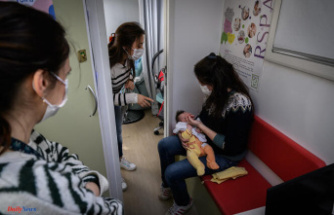Merz railed against gender, the debate about the women's quota is passionate and continues heatedly in the dispute about equality between men and women. The topic of women dominates the CDU party conference. Wanted or not.
It's no secret that the CDU has a problem with women. With a meager 26 percent share of female members, the party knows that too. It's "shameful," says former Food Minister Julia Klöckner to ntv.de. It is therefore not surprising that the subject received a great deal of attention at the 35th party congress in Hanover. Whether it's a women's quota or the demand for equality between men and women as part of the Charter of Fundamental Values - no other discussion is conducted as passionately as that of the position of women in the Union. What is significant, however, is how differently the party wants to deal with the problem.
There is no vote on the question of whether gender is appropriate in the German language. However, the thunderous applause that party leader Friedrich Merz received when he attacked universities and public broadcasting for gender issues speaks for itself. Although the Union wants to modernize itself, it remains consistently conservative on this point.
In general, opinions are still divided as to how the modernization of the party should look like. The Junge Union, which is calling for a renewal of the party, sees the introduction of a women's quota as anything but progressive. Among the 34 speakers, it is primarily the young women who vehemently reject a quota. The exchange of blows with the supporters, who want to push the female occupation of CDU offices just as energetically, is charged. No sign of unity.
As heated as the evening of the first day in Hanover ends, it continues the morning after: The motion to include equal rights as well as equality in the new basic program is preceded by a lengthy and controversial discussion. Again, the union splits in two: the opponents of the women's quota - the MIT association for medium-sized businesses and the Junge Union - are opposed to the concept of "equality". One does not want to place oneself above the decision of the individual, it is about equal opportunities.
But in the end they get the short end of the stick again. The head of the women's union, Annette Widmann-Mauz, asserts itself with her demand that basic values have to be adapted to the changing times. She receives prominent support from CDU Vice Karin Prien and the North Rhine-Westphalian Minister Ina Scharrenbach. The Junge Union and the Mittelstandsvereinigung have to accept their second defeat at this party congress with gnashing of teeth.
Even if Merz tries in advance to downplay the issue: the question of the position of women in the CDU is polarizing. No other topic is discussed so controversially at the party congress, none gets so much attention and is fueled by prominent speakers. The women in particular are clearly concerned about their own role in the party, the combination of family and work and their own chances of advancement. The CDU agrees that they recognize their female offspring problem. Dealing with it, however, is drawing a rift through the Union that will take a lot of work to close.












